#Cultural Adaptability
Explore tagged Tumblr posts
Text
Maybe I’m just too sensitive to people using Palestinian culture for their own means (or just straight up stealing it) but I do get kinda annoyed when I see artists doing “biblically accurate” depictions of figures from Christianity and clearly using modern Palestinian clothing for it and not mentioning it anywhere. For example a thobe malak isn’t “bible clothing” and not mentioning your references anywhere contributes to the erasure of Palestinian culture. One of the aims of Zionist propaganda is the complete removal of Palestinians from both Palestine and our own cultural and historical narrative. Like sure man, you can use Palestinian clothing for your artwork, but at least say what you are referencing. Stop cutting Palestinians out of the picture because you don’t want to add another sentence to the description
#shoutout Palestinian Christian artists. they do it better than any artist on this app#also: Palestinian clothing as we understand it now is not a 1:1 with the clothing being worn at the time sure it’s definitely similar#but I see many people fall into this trap of cultural stasis about palestine and there has never ever been anything static about the levant#Palestinian culture just as all cultures around the world move like living organisms that grow adapt and change
2K notes
·
View notes
Text
Bridging Cultural Gaps and Succeeding Globally: Nurturing Synergy in Diversity

In today's interconnected world, the ability to bridge cultural gaps is not just a valuable skill, it is a necessity. "Bridging Cultural Gaps and Succeeding Globally: Nurturing Synergy in Diversity" embodies the essence of a transformative journey, one that transcends borders, languages, and traditions to celebrate the richness of human diversity while recognizing the shared aspirations that bind us all.
Cultural diversity is more than just a mosaic of customs, languages, and beliefs; it is a wellspring of innovation, creativity, and endless possibilities. Embracing this diversity is not only a moral imperative but also a strategic advantage in the global arena. By nurturing synergy in diversity, individuals and organizations alike can unlock a wealth of perspectives, ideas, and talents, propelling them to new heights of success.
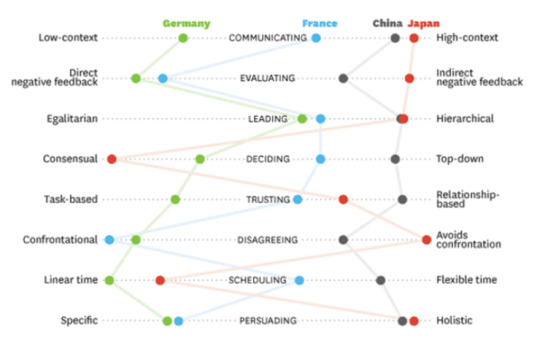
Source: Source: Meyer, E. 2014. Management Styles Across Four Different Cultures.
In our quest to bridge these cultural gaps, we embark on a journey that requires open-mindedness, empathy, and a willingness to learn. It involves engaging in meaningful dialogues that promote understanding and dispel stereotypes. It demands the recognition of the inherent value each culture brings to the table and the wisdom to leverage this diversity for mutual benefit.
Through this journey, we not only dismantle barriers but also cultivate deep connections that enrich our personal and professional lives. We learn the art of effective communication, transcending language barriers to truly comprehend the nuances of thought and emotion. We embrace the beauty of traditions, understanding that they are threads weaving the fabric of our global society, connecting us through shared stories and histories.
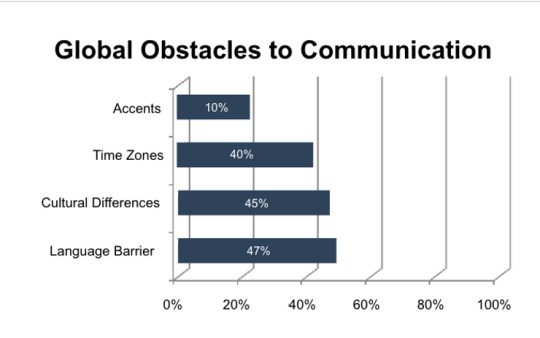
Source: Semantic Scholar
In essence, "Bridging Cultural Gaps and Succeeding Globally, Nurturing Synergy in Diversity" is a call to action, an invitation to embrace the world with open arms and open minds. It is a reminder that our shared humanity is far more profound than our differences and that by celebrating these differences, we pave the way for a brighter, more harmonious future – a future where the synergy born from cultural diversity propels us to unprecedented levels of global success.
In the complex tapestry of international business, successfully bridging cultural gaps is not just a challenge; it's an opportunity for growth, understanding, and sustainable global success. This aspect involves several key topics that are crucial in ensuring harmonious collaborations and fruitful business relationships across borders.
1. Cross-Cultural Communication: Crafting Effective Strategies
India's rich cultural diversity is a testament to its vibrant heritage, but it also means that communication styles, gestures, and etiquettes can vary significantly across regions. Developing tailored Cross-Cultural Communication strategies is imperative. Businesses must train their employees to communicate effectively, ensuring that messages are not just translated but also culturally resonant. Understanding nuances in tone, body language, and context is vital to avoid misunderstandings and establish strong connections with global stakeholders. By investing in cross-cultural communication training, Indian firms can bridge linguistic and cultural divides, fostering trust and mutual respect.
2. Building Global Relationships: Leveraging Cultural Connections
India's extensive diaspora and cultural connections around the world provide a unique advantage in Building Global Relationships. Indian firms can tap into these networks to establish meaningful connections with international partners, clients, and consumers. Cultural affinity often forms the basis of trust in global business relationships. By leveraging shared cultural experiences and values, businesses can create a solid foundation for collaboration. Networking events, cultural exchanges, and leveraging social media platforms that cater to specific cultural groups can facilitate the establishment of robust global networks, opening doors to new opportunities and markets.
3. Managing Cultural Differences: Turning Diversity into Strength
Cultural differences, if managed effectively, can transform into assets rather than challenges. Preparing Indian firms to Manage Cultural Differences involves comprehensive training programs that focus on cultural intelligence, empathy, and adaptability. By understanding diverse cultural perspectives, businesses can harness the creativity that emerges from varied viewpoints. Moreover, learning to navigate cultural differences helps in preventing misunderstandings and conflicts. Cultural training should be ongoing, ensuring that employees are continually updated on global cultural norms and practices. Emphasizing the celebration of cultural diversity within the organization can create an inclusive environment where employees feel valued for their unique perspectives and contributions.
4. Fostering a Culture of Inclusivity and Respect
Beyond specific strategies, fostering a Culture of Inclusivity and Respect is essential. This involves creating policies and practices within the organization that champion diversity and multiculturalism. Inclusivity should be embedded in recruitment processes, employee training, and professional development programs. Recognizing and celebrating cultural festivals and events from various parts of India and the world can foster a sense of belonging among employees. Additionally, promoting leadership opportunities for individuals from diverse cultural backgrounds ensures that different perspectives are represented at decision-making levels, leading to a more comprehensive and informed organizational strategy.
Conclusion: Embracing Diversity, Empowering Success
In the global arena, where borders blur and connections span continents, the ability to bridge cultural gaps is a core competency. Indian firms, armed with an understanding of cross-cultural communication, a robust global network, effective management of cultural differences, and a culture of inclusivity, can not only succeed but also thrive globally. By transforming diversity into strength, businesses can navigate the complexities of international collaborations with grace and wisdom, ultimately contributing to a more interconnected, empathetic, and prosperous world.
Conclusion
Working with international cultures enriches the workplace by fostering a global mindset, encouraging inclusivity, and promoting mutual respect among employees. Embracing cultural diversity is not just a moral imperative but also a strategic advantage in today's globalized economy. By investing in cultural intelligence, effective communication, respect for differences, and conflict resolution skills, organizations can create an inclusive and harmonious work environment where employees thrive, and creativity and innovation flourish. Embracing unity in diversity is not only a testament to the organization's commitment to inclusivity but also a pathway to a more connected and compassionate world.
Global Launch Base helps international startups expand in India. Our services include market research, validation through surveys, developing a network, building partnerships, fundraising, and strategy revenue growth. Get in touch to learn more about us.
Contact Info:
Website: www.globallaunchbase.com
LinkedIn: https://www.linkedin.com/company/globallaunchbase/
Email: [email protected]
#Cultural Diversity#Global Business#Cross-Cultural Communication#International Collaboration#Cultural Sensitivity#Inclusive Leadership#Synergy in Diversity#Global Teamwork#Cultural Adaptability#Intercultural Competence#Cultural Awareness#Global Leadership#Cultural Intelligence#Collaborative Multiculturalism#Harmony in Diversity#Cultural Integration#Global Success Strategies#Cultural Empathy#Cultural Differences#Diverse Workforce
1 note
·
View note
Text
Why does realism always have to mean superheroes hating that they’re superheroes and/or killing people? Why can’t it mean superheroes becoming symbols of protest? Why can’t it mean people hanging/waving Superman flags to symbolize a nation/world in crisis? Why can’t it mean Wonder Woman imagery becoming symbols of anti-war and feminist movements? Why can’t it mean people spray painting bat symbols to signify police brutality and corruption? Why can’t it mean people wearing Robin merchandise to support children’s rights? Why can’t it mean people painting lanterns green to bring them to protests? Why can’t it mean people getting green and red arrow tattoos to represent standing in solidarity with the impoverished?
#This is one part of my larger opinion that I wished that more “realistic” adaptations of superheroes looked at how the existence of#superheroes would impact the world and culture around them#superman#Clark Kent#wonder woman#diana prince#batman#bruce wayne#batfam#batfamily#robin#dick grayson#jason todd#tim drake#damian wayne#green lantern#green lantern corps#hal jordan#john stewart#kyle rayner#jessica cruz#green arrow#red arrow#arsenal#oliver queen#roy harper#my stooff#dc#dc comics
692 notes
·
View notes
Text
I have a HC that Kurt is Romani/practices Romani traditions since his foster mother and siblings are canonically Romani. Ive learned a little about the culture from watching and finding actual Roma people online and such and learning about their culture and traditional clothings, so I drew Kurt in an outfit referenced from it!
I want to learn more about the culture and what I can and can’t portray- since I know a lot of Romani culture is closed practices for protection and preservation purposes- so if anyone knows any good reliable sources I’d love to know!
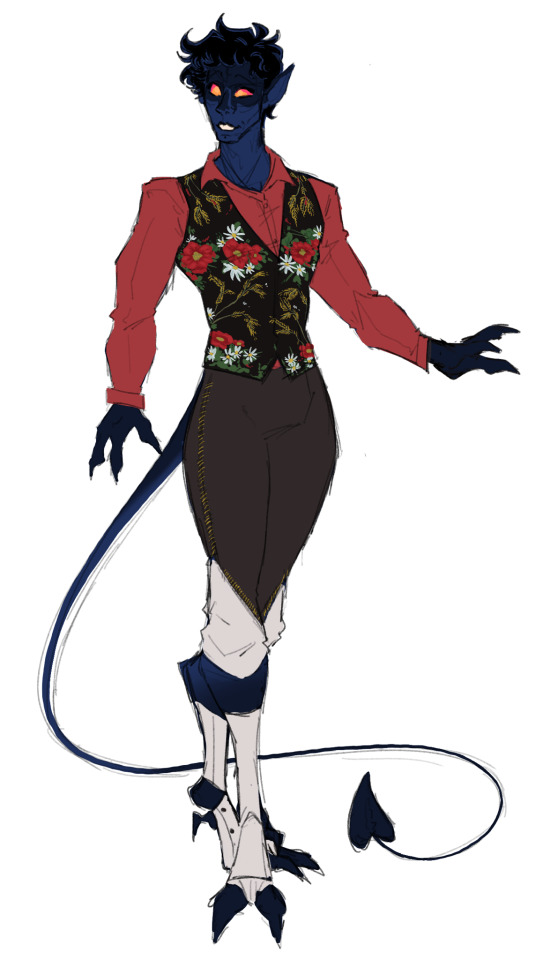
A lot of what I’ve learned came from this creator @ florida.florian on TikTok! And that’s who I actually referenced Kurt’s outfit from too!

#my art#art#my artwork#sketches#character design#xmen fanart#x men 97#X-men#x men art#nightcrawler#kurt wagner#romani people#romani history#Romani#culture#my adaptation#my design#headcanons#head canon
1K notes
·
View notes
Text
Demon Twins AU that focuses on the discrimination and bullying that Danny faces from being a kid who appeared out of nowhere, evidently adopted, and is impacted from his reactions to the world as a former League Assassin and the culture shock that would come from it forever imprinted on the minds of his peers and fellow Amity Parkers.
#bones writes in the tags#dpxdc#danny phantom#dp x dc#bones prompts#as someone from a mid tier sized town in the Midwest I can count the amount of people in my high school graduating class that wasn’t white#on one hand. it was a moderate 3 digit amount of students in my graduating class too.#if y’all want to make Danny an identical twin of Damian and view Damian as not white passing#then Danny isn’t either. give him the difficulties that comes with it#children are mean. teenagers are even crueler. I was The Wierd Kid in elementary school (unmedicated severe ADHD)#that affected me for the rest of my schooling and my peers still viewed me as that weird kid because I knew them since I was 6#that shit doesn’t just go away. because of Danny’s strange attitude and adapting to the violently different culture and social norms#that coupled with the fact that he was adopted by the weird eccentric ghost scientists? living hell.
286 notes
·
View notes
Text


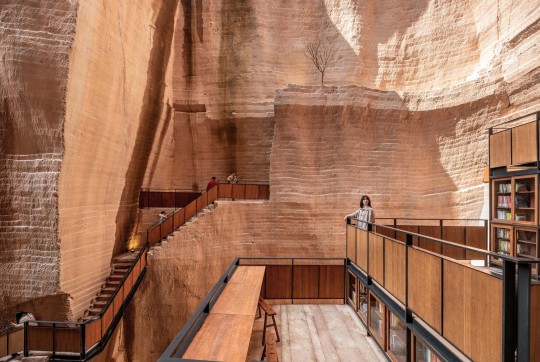
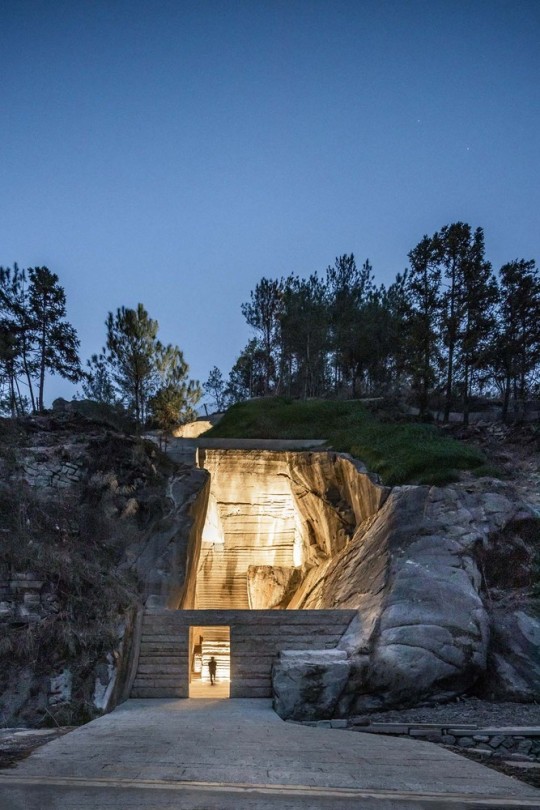
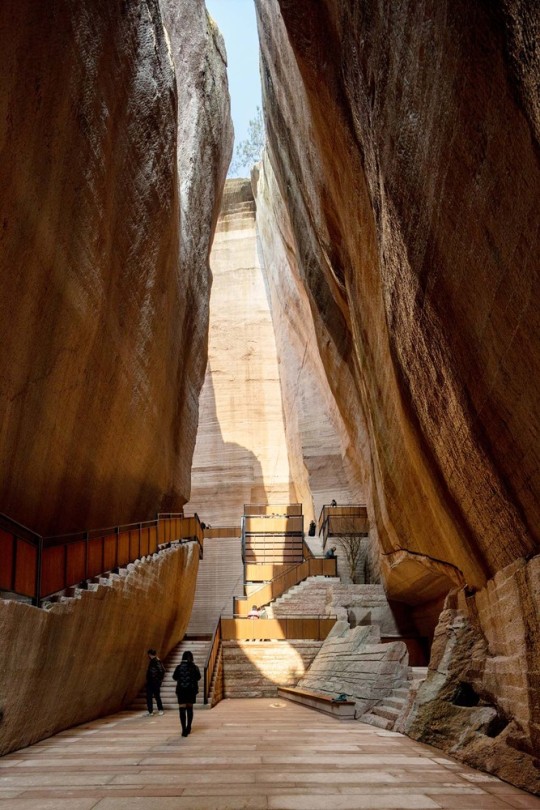
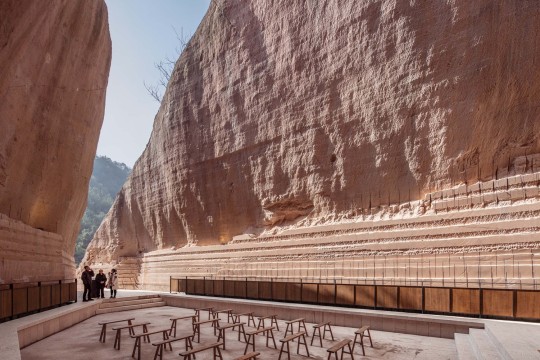
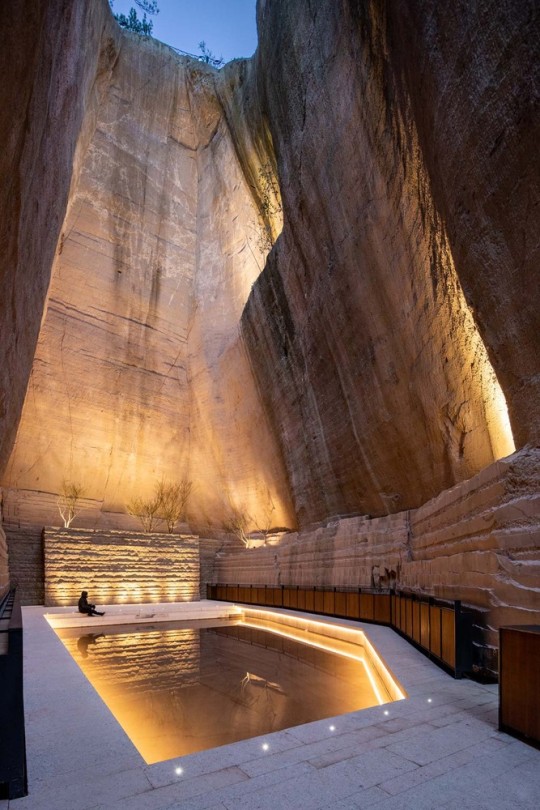
Quarry No. 8 & 9, Lishui, China - DnA
#DnA#architecture#design#building#modern architecture#minimal#modern#concrete#stone#stone building#stairs#quarry#adaptive reuse#inventive#amazing design#amazing places#landscape#tall#light#library#book shelves#books#reading spot#china#theatre#cultural#chinese architecture#design blog
177 notes
·
View notes
Text
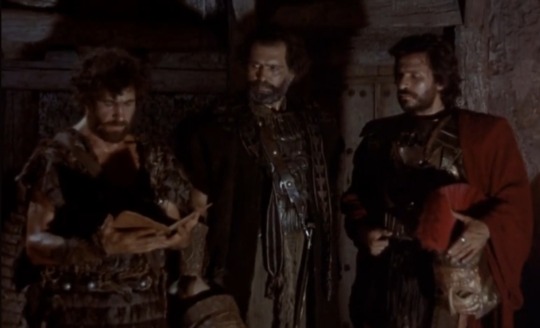
Christos Tsagas, Kostas Kazakos and Kostas Karras
As Odysseus, Agamemnon and Menelaus
In Iphigenia (1977)
You can't find a better trio! They look amazing together! Even their heights are perfect! Tsagas is simply Odysseus! Straight out! He was arguably the shortest of the team and corresponding to the description of Homer being like a ram (curly hair and proud posture) and very well built seemingly wider than Kazakos even! Moreover, Tsagas was born in 1939 making him 38 in 1977 when the movie came out! He is simply perfect!
Here's another image with him next to Dimitris Arronis as Calchas and Panos Michalpoulos as Achilles:
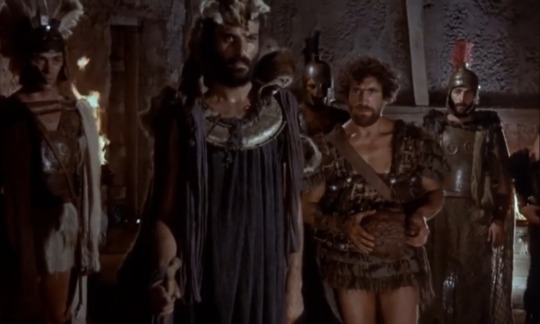
Gotta love the cultural details how Odysseus removes his hat within the conference room to show respect the same way that our men remove their hats in churches or during sacred moments (ex. Funerals) to show how he respects the process as well as Calchas as a prophet for his position.
#greek mythology#tagamemnon#odysseus#the odyssey#homeric poems#the iliad#odyssey#iliad#iphigenia#iphigenia 1977#christos tsagas#dimitris arronis#kostas kazakos#kostas karras#michalis kakogiannis#Cacoyannis#iphigenia in aulis#euripedes#ancient greek tragedy#greek tragedy#iphigenia 1977 is the pique of mythology adaptation!#greek culture#greek culture done right!#menelaus#agamemnon#calchas#achilles#agamemnon and menelaus#odysseus and agamemnon#odysseus and menelaus
235 notes
·
View notes
Text










Аленький цветочек / The Scarlet Flower (1978) dir. Marina Ilyichyova
#Аленький цветочек#the scarlet flower#soviet cinema#worldcinema#worldcinemaedit#dailyworldcinema#fyeahmovies#fuckyeahwomenfilmdirectors#filmedit#filmgifs#myedit#🎬.mp4#films#beauty and the beast#fairytales and folklore#1978 producing not one but two dreamy beauty and the beast adaptations. the year of true culture#this one leans less on the gothic terror side but it was actually really heartwarming ;-;#and i've never seen a version of batb that had such a large role for the enchantress but it was so delicious
148 notes
·
View notes
Text
can we ride on the success of nosferatu and actually have a good dracula adaptation now. like, one that actually follows the actual plot of dracula. is the world ready
#PLEASE#i feel like now is the time !!!!!!!#i just want a faithful adaptation because we need to rehabilitate dracula's image#the book is so much better than you could imagine if you only know about dracula from its adaptations and pop culture#i personally think it should be a limited series too. not a movie#it's so long but it could be adapted so well. the first episode is all jonathan at castle dracula. maybe even the first two episodes#then we go to mina and lucy#and a whole episode for the demeter#like do you see the vision#dracula#bram stoker#nosferatu#mine
184 notes
·
View notes
Text
We’ve now found ourselves amid another shift in mass communication. One where algorithms successfully replaced ink and airwaves. And, just as 20th-century mass media created the concept of the consumer a hundred years ago, so too has this current shift redefined how we interact with the world. And accepting that this shift is permanent, in the sense that we can’t simply reverse it, is, I’m convinced, the only way forward. We are now either influencers or influenced.
#I think we still haven’t fully assimilated what the new technological/cultural landscape that’s come fully into shape since the pandemic#means for novels and literature. And how best we can adapt to it.#original post#garbage day#ryan broderick
151 notes
·
View notes
Text
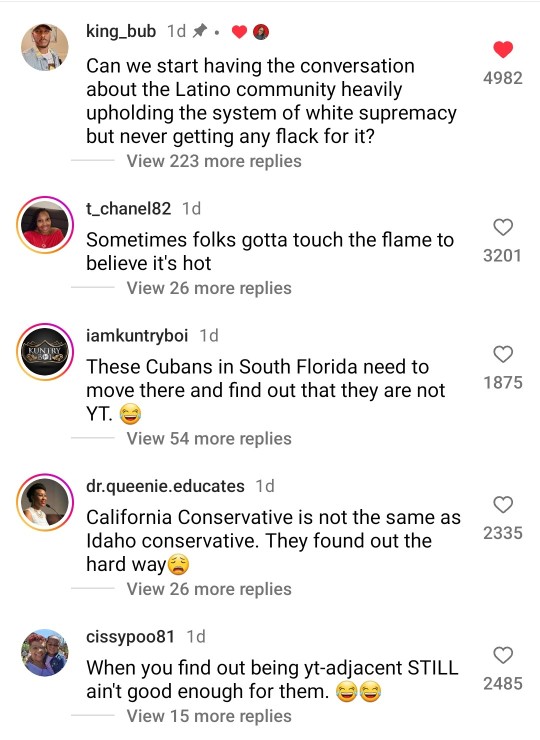

nah nah nah. y'all wanted to be white so bad, stay there with them and EAT THAT RACISM smfh
#california to idaho move#conservative family#difficulties fitting in#judgmental attitudes#gossip#tiktok announcement#return to california#political differences#moving experiences#conservative state challenges#social dynamics#melvin galang#coree ray#blue state return#gem state#conservative politics#family relocation#community acceptance#social judgment#new environment adaptation#idaho move regrets#conservative to liberal shift#fitting in challenges#family relocation issues#conservative community judgment#gossip in small towns#social adaptation struggles#moving back to california#conservative state culture shock#community politics
552 notes
·
View notes
Text
one of the best parts about being a Catholic is that Halloween is a Catholic holiday <3
#MEMENTO MORI#i can participate fully lets GOOO#:D#THIS IS HALLOWEEN THIS IS HALLOWEEN HALLOWEEN HALLOWEEN HALLOWEEN HALLOWEEN#catholic things#hell yeah i love the way christianity adapted to pagan cultures and incorporated traditions into holiness#its so fun
235 notes
·
View notes
Text

#culture#pop culture#fact#facts#gatekeeping#music#movies#video games#minecraft#minecraft movie#bad adaptation#memes#meme#shitpost#shitposting#sad but true#fandom#fandom problems
113 notes
·
View notes
Text
In my Zeus bag today so I'm just gonna put it out there that exactly none of the great Ancient Greek warrior-heroes stayed loyal and faithful and completely monogamous and yet none of them have their greatness questioned nor do we question why they had the cultural prominence that they did and still do.
Jason, the brilliant leader of the Argo, got cold feet when it came to Medea - already put off by some of her magic and then exiled from his birthland because of her political ploys, he took Creusa to bed and fully intended on marrying her despite not properly dissolving things with Medea.
Theseus was a fierce warrior and an incredibly talented king but he had a horrible temper and was almost fatally weak to women. This is the man who got imprisoned in the Underworld for trying to get a friend laid, the man who started the whole Attic War because he couldn't keep his legs closed.
And we cannot at all forget Heracles for whom a not inconsiderable amount of his joy in life was loving people then losing the people around him that he loved. Wives, children, serving boys, mentors, Heracles had a list of lovers - male and female - long enough to rival some gods and even after completing his labours and coming down to the end of his life, he did not have one wife but three.
And y'know what, just because he's a cultural darling, I'll put Achilles up here too because that man was a Theseus type where he was fantastic at the thing he was born to do (that is, fight whereas Theseus' was to rule) but that was not enough to eclipse his horrid temper and his weakness to young pretty things. This is the man that killed two of Apollo's sons because they wouldn't let him hit - Tenes because he refused to let Achilles have his sister and Troilus who refused Achilles so vehemently that he ran into Apollo's temple to avoid him and still couldn't escape.
All four of these men are still celebrated as great heroes and men. All four of these men are given the dignity of nuance, of having their flaws treated as just that, flaws which enrich their character and can be used to discuss the wider cultural point of what truly makes a hero heroic. All four of these men still have their legacies respected.
Why can that same mindset not be applied to Zeus? Zeus, who was a warrior-king raised in seclusion apart from his family. Zeus who must have learned to embrace the violence of thunder for every time he cried as a babe, the Corybantes would bang their shields to hide the sound. Zeus learned to be great because being good would not see the universe's affairs in its order.
The wonderful thing about sympathy is that we never run out of it. There's no rule stopping us from being sympathetic to multiple plights at once, there's no law that necessitate things always exist on the good-evil binary. Yes, Zeus sentenced Prometheus to sufferation in Tartarus for what (to us) seems like a cruel reason. Prometheus only wanted to help humans! But when you think about Prometheus' actions from a king's perspective, the narrative is completely different: Prometheus stole divine knowledge and gifted it to humans after Zeus explicitly told him not to. And this was after Prometheus cheated all the gods out of a huge portion of wealth by having humans keep the best part of a sacrifice's meat while the gods must delight themselves with bones, fat and skin. Yes, Zeus gave Persephone away to Hades without consulting Demeter but what king consults a woman who is not his wife about the arrangement of his daughter's marriage to another king? Yes, Zeus breaks the marriage vows he set with Hera despite his love of her but what is the Master of Fate if not its staunchest slave?
The nuance is there. Even in his most bizarre actions, the nuance and logic and reason is there. The Ancient Greeks weren't a daft people, they worshipped Zeus as their primary god for a reason and they did not associate him with half the vices modern audiences take issue with. Zeus was a father, a visitor, a protector, a fair judge of character, a guide for the lost, the arbiter of revenge for those that had been wronged, a pillar of strength for those who needed it and a shield to protect those who made their home among the biting snakes. His children were reflections of him, extensions of his will who acted both as his mercy and as his retribution, his brothers and sisters deferred to him because he was wise as well as powerful. Zeus didn't become king by accident and it is a damn shame he does not get more respect.
#ginger rambles#ginger chats about greek myths#greek mythology#It's Zeus Apologist day actually#For the record Jason is my personal favourite of these guys#The argonauts are extremely underrated for literally no reason#And Jason's wit and sheer ability to adapt along with his piousness are traits that are so far away from what usually gets highlighted#with the typical Greek warrior-hero that I've just never stopped being captivated by him#Conversely I still do not understand what people see in Achilles#I respect him and his legacy I respect the importance of his tale and his cultural importance I promise I do#However I personally can't stand the guy LMAO#How do you get warned twice TWICE both by your mother and by Athena herself that going after Apollo's children is a bad idea#And still have the audacity to be mad and surprised when Apollo is gunning for Specifically You during the war you're bringing to His City#That You Specifically and Exclusively had a choice in avoiding#ACHILLES COULD'VE JUST SAID NO#I know that's not the point however so many other members of the Greek camp were simply casualties of Fate in every conceivable way man#Achilles looked at every terrible choice he could possibly make said “Well I'm gonna die anyway 🤷🏽” and proceeded to make the choice#so hard that he angered god#That's y'all's man right there#I left out Perseus because truthfully I don't actually know much about him#I haven't studied him even a fraction as much as I've studied some of the other big culture heroes and none of this is cited so i don't wan#to talk about stuff I don't know 100%#Anyway justice for Zeus fr#Gimme something give me literally anything other than the nonsense we usually get for him#This goes for Hera too btw#Both the king and queen of the skies are done TERRIBLY by wider greek myth audiences and it's genuinely disheartening to see#If y'all could make excuses for Achilles to forgive his flaws y'all can do it for them#They have a lot more to sympathise with I'll tell you that#(that is a completely biased statement; you are completely free and encouraged to enjoy whichever figures spark joy)#zeus
262 notes
·
View notes
Text
like idk it just seems actually nefarious to take one of the very few widely known instances of queerness in older history being a symbol to show queer people that we've always existed and aren't alone for CENTURIES and taking away the queerness from it. like. i know some people say that ''the queerness isnt important in the book" which i mean in my opinion i could go off for 10k words in an essay as to how basil's love for dorian is integral to the story BUT EVEN APART from that its really just. having a real explicitly queer character in such an old and widely regarded classic novel is HUGE for queer history and this is just. literally like. its 2024. why are you doing queer erasure to DORIAN GRAY
#MAKE YOUR OWN SHIT OR LIKE GET OUTTT#WHAT????#also not the cishets going ''omggg queer people are predatory enough so it shouldnt change it to ship incest now" WHAT??????#girl do you see. what you are doing. girl. @ the creator#why do they let these people make adaptations. what the actual hell#amory rambles#SORRY IM LITERALLY LIKE ACTUALLY SO LIKE. DEEPLY OFFENDED RN WHICH IS LIKE SUCH A WORD TO USE I KNOW BUT LIKE#ITS ALL I CAN THINK OF TO SAY BECAUSE WHAT. THE HELL.#as an anthropology/creative writing major the importance of having these types of evidences of queer culture in history so far back#is something insurmountable in validating queerness#and to take that and like. oh my goddd#like i could go off for ages about even queer authors that arent so widely known as queer/didnt write explicitly queer things like gogol#who are erased to a point where you have to dig to learn about his history because its been so covered up by people trying to erase us#and like#in the year 2024 dear fucking lord!!#what are we doing???#sorry my dfjlksdfjsdf dfih8sojidfk s. sidhfojl kmsdf . im so actually mad right now LMAOOO#the picture of dorian gray#dorian gray#oscar wilde#tpodg#and like tpodg isnt even one of my favorite novels like i like it a lot but i see it as so fucking important#anywho#so glad we are all being loud as hell about this bc thats the way to make this mfer take notice
397 notes
·
View notes
Text


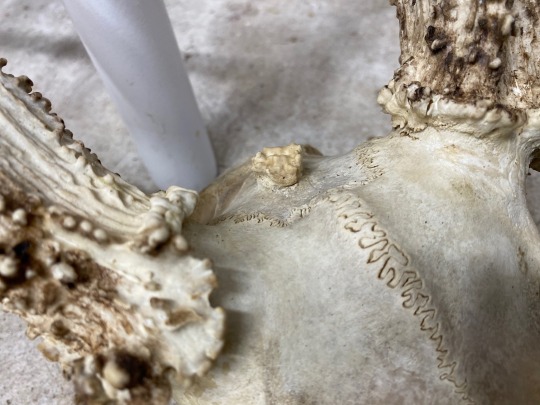
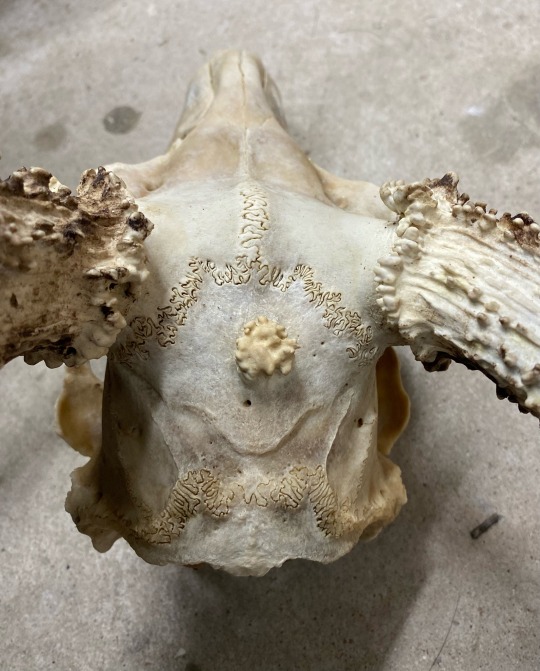
Shoutout to this massive buck that had a third antler growing in
#been getting a lot of freaks in lately and I am a-ok with that#third antlers like this can sometimes happen when cells from the pedacle of an antler get transferred to another spot via injury#this will then cause an antler to grow in that location because antler growth is one hell of an adaptation#now was this from an injury? no idea#genuinely I think it’s just a funky mutation#european mount#whitetail deer#skull#taxidermy#vulture culture#taxidermist#cw dead animal#tw animal death#tw dead animal#cw animal death#oddities
561 notes
·
View notes